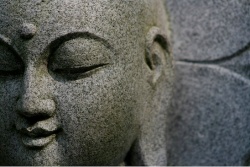Causation
Causation is the "causal relationship between conduct and result". That is to say that causation provides a means of connecting conduct with a resulting effect, typically an injury. In criminal law, it is defined as the actus reus (an action) from which the specific injury or other effect arose and is combined with mens rea (a state of mind) to comprise the elements of guilt. Causation is only applicable where a result has been achieved and therefore is immaterial with regard to inchoate offenses.
Shakyamuni Buddha did not regard this universe as Gods' creation or his conquest but as resulting from the relation of cause and effect by which all phenomena are produced.
“Causation” means a primary cause and a secondary cause combining to produce effect and a recompense.
In this world, there is nothing unchanged or fixed in form. All things have a direct cause (primary cause). When this comes into contact with an opportunity or condition (secondary cause), the result of this conjunction appears as a phenomenon (effect). This effect leaves behind traces (recompense): thus Shakyamuni Buddha interpreted all things in this world.
The combination of a primary cause and a secondary cause leads every action to an effect and a recompense. When a primary cause is annihilated or when, even if it exist, it does not come into contact with a secondary cause, it does not produce an effect and a recompense.
Shakyamuni Buddha expounded this rule through the doctrine of dependent origination, meaning that all phenomena are produced and annihilated by cause. This term indicates a thing arises from or is produced through the agency of a condition (a secondary cause). A thing does not take form unless there is an appropriate condition. This truth applies to all existence and phenomena in the universe. The Buddha intuitively perceived this so profoundly that even modern science cannot probe further.
When the conditions change, the substances produced change and take another form. When water comes into contact with a high temperature as a condition, it evaporates. When vapor comes into contact with cold air as a condition, it condenses and forms a cloud. Events and function of the mind are similar; there is nothing that does not follow this basic rule.
